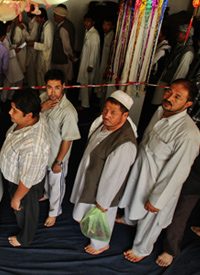
With about 10 percent of the votes in Afghanistan’s presidential election having been counted on August 25, incumbent President Hamid Karzai and his leading challenger Abdullah Abdullah each had approximately 40 percent of the nationwide vote, with 40.6 percent (212,927 votes) for Karzai and 38.7 percent (202,889 votes) for Abdullah.
The Independent Election Commission plans to release partial results each day over the next several days, but certified results from the August 20 election will not be ready until mid-September. If neither candidate receives more than 50 percent of the vote, the two leading candidates will compete in a run-off, most likely in early October.
Following the initial announcement of the vote tallies, AFP quoted Daud Najafi, the chief electoral officer, who stated emphatically: "I repeat again, this is partial results of about 10 percent of the overall vote. I repeat again, this will definitely change tomorrow, the day after tomorrow. This is only partial results."
Allegations of voting irregularities persisted, though. Just before the results were announced, Abdullah said at a news conference: "If the widespread rigging is ignored this is the type of regime that will be imposed upon Afghanistan for the next five years and with that sort of a system, a system that has destroyed every institution, broken every law."
"The Election commission received over 400 complaints so far, with more than 40 possible major enough to affect (the) outcome," according to the joint statement quoted by CNN from Ashraf Ghani Ahmadzai, Mirwais Yassini, Motasimbillah Mazhabi, Sayed Jalal Karim, Frozan Fanah, and Bismillah Shir. The statement said many of the allegations "are seriously questioning the legitimacy and credibility of the results."
"The Afghan nation wants their voice to be heard and their questions must be answered by the election commission and the international observers," said the commission spokesmen.
Candidate Abdullah told CNN in an interview that his campaign had received what he described as credible reports of fraud in the southern provinces, where security was poor and turnout was less than 10 percent. Abdullah said ballot boxes were stuffed with additional votes, with 90 percent of them going to Karzai.
"This is stealing the elections, and it will not be accepted," he said in the interview, basing his allegations on accounts of witnesses and on videos. CNN reported that no videos were made public and it was not clear whether any had been turned over to the Electoral Complaints Commission.
The AP reported that Abdullah showed reporters a packet of ballots with an official authorizing stamp on the back that would allow the ballots to be cast — all marked for Karzai. He also played a video of what he said were Karzai supporters in Ghazni province marking dozens of ballots for Karzai, as well as a picture of a polling place in the southern part of the country showing people he identified as Karzai campaign officials looking over the shoulders of voters.
By the evening of August 24, the independent Electoral Complaints Commission reported receiving more than 50 allegations of fraud that could affect the election results if substantiated. Final election results cannot be certified as legitimate until the complaints commission rules on all such allegations.
Bloomberg News quoted the Electoral Complaints Commission head Grant Kippen, who said that 35 of 225 complaints registered about election irregularities were "material to the outcome" of the election. The commission can order recounts or a repeat of voting wherever it finds fraud.
In answer to speculation that Abdullah might strike a deal with Karzai to avoid a dragged-out controversy arising from disputed returns, Abdullah dismissed suggestions that he might make some sort of agreement with Karzai to join a new government led by the incumbent, telling CNN: "I will not make a deal, enough deals have been made in this country and that’s taking this country to the past."
Following the 2004 Afghan presidential elections, Abdullah was one of the few people who kept their positions from the previous Transitional Government. Abdullah was re-appointed as Minister of Foreign Affairs in the then-new Karzai government.
"Afghanistan: bloodiest year for international troops since 2001," an article in the British Telegraph for August 25, ran this subhead: "The deaths of four U.S. soldiers in Afghanistan means 2009 has become the bloodiest year for international troops since operations began in 2001." The article begins: "The American fatalities take the death toll for 2009 to 295, including 69 British service personnel."
But it is the writer’s next comment that is both timely and poignant: "With preliminary results due in Afghanistan’s election today, the deaths are a stark reminder of the cost of providing security in the country."
Finally, after summarizing the early election results, the article concludes:
The deaths of the U.S. troops today followed reports that commanders had requested reinforcements.
President Barack Obama’s special representative to the region, Richard Holbrooke, has been told by all four regional commands in Afghanistan that there are insufficient troops to contend with the Taliban insurgency, according to an article in the New York Times on Monday [August 24].
It is evident that the Telegraph reporter, sandwiching the election details between the preliminary and concluding statements, sees a certain irony in the price that U.S. and UK forces must pay to ensure enough stability in Afghanistan to hold a credible election. The irony is heightened by the fact that the outcome of the election is apt to be disputed and that dispute may fuel further violence in that hapless nation. Furthermore, the discussion of the U.S. government’s impending call for even more troops indicates that the successful conclusion of this mission is far from over; indeed it may be just warming up.
The Telegraph‘s "stark reminder" is badly needed and should give many U.S. and UK citizens serious food for thought.
Photo: AP Images



